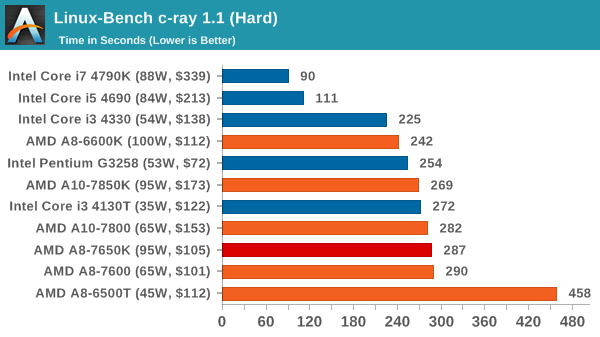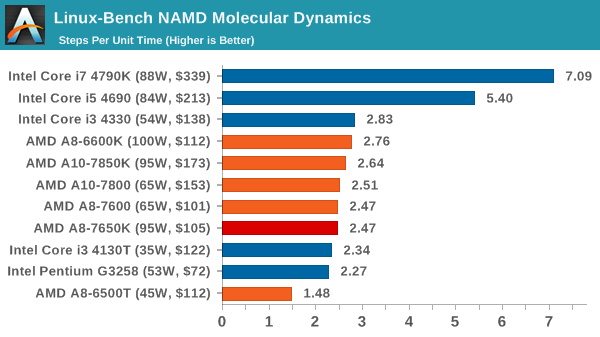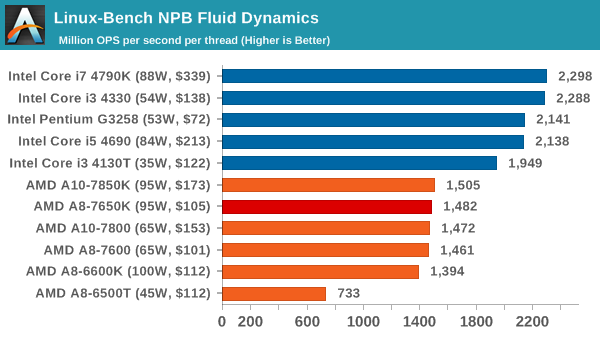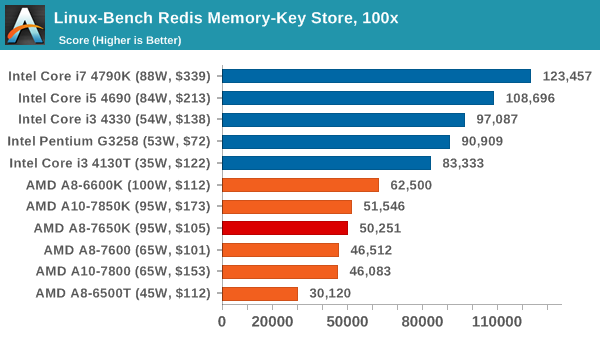The AMD A8-7650K APU Review, Also New Testing Methodology
by Ian Cutress on May 12, 2015 10:00 AM ESTProfessional Performance: Linux
Built around several freely available benchmarks for Linux, Linux-Bench is a project spearheaded by Patrick at ServeTheHome to streamline about a dozen of these tests in a single neat package run via a set of three commands using an Ubuntu 11.04 LiveCD. These tests include fluid dynamics used by NASA, ray-tracing, OpenSSL, molecular modeling, and a scalable data structure server for web deployments. We run Linux-Bench and have chosen to report a select few of the tests that rely on CPU and DRAM speed.
C-Ray: link
C-Ray is a simple ray-tracing program that focuses almost exclusively on processor performance rather than DRAM access. The test in Linux-Bench renders a heavy complex scene offering a large scalable scenario.

Being a scaling benchmark, C-Ray prefers threads and seems more designed for Intel.
NAMD, Scalable Molecular Dynamics: link
Developed by the Theoretical and Computational Biophysics Group at the University of Illinois at Urbana-Champaign, NAMD is a set of parallel molecular dynamics codes for extreme parallelization up to and beyond 200,000 cores. The reference paper detailing NAMD has over 4000 citations, and our testing runs a small simulation where the calculation steps per unit time is the output vector.

NAMD is similar to our office benchmarks, puttin the bulk of the APUs between the i3-4130T and the i3-4330.
NPB, Fluid Dynamics: link
Aside from LINPACK, there are many other ways to benchmark supercomputers in terms of how effective they are for various types of mathematical processes. The NAS Parallel Benchmarks (NPB) are a set of small programs originally designed for NASA to test their supercomputers in terms of fluid dynamics simulations, useful for airflow reactions and design.

Despite the rated memory on the APUs being faster, NPB seems to require more IPC than DRAM speed.
Redis: link
Many of the online applications rely on key-value caches and data structure servers to operate. Redis is an open-source, scalable web technology with a b developer base, but also relies heavily on memory bandwidth as well as CPU performance.











177 Comments
View All Comments
CPUGPUGURU - Tuesday, May 12, 2015 - link
AMD APU is a watt, money, time wasting bottlenecking inferior choice that there is next to no market for, for AMD fusion was and still is a delusion. Intel's world class IPC performance, node process and a dGPU are a MUCH BETTER investment.Intel's APU's performance advantage makes them a wise choice for the Tablet, Convertible, or Ultrabook market, I'm looking forward to a Surface Skylake to go mobile with.
mayankleoboy1 - Tuesday, May 12, 2015 - link
Ian, this is probably the 3rd or 4th testing methodology/benchmark changes that you have seen during AT. My question is:Do you think that Multithreading is *really* more mainstream now? As in, do most general purpose softwares use more than 2 cores?
Ian Cutress - Tuesday, May 12, 2015 - link
The way I like to think about it is that even if software only uses one core, I like to have many on the go at the time. Chrome tabs are a nice example.But multithreading is now being taught in some CS undergraduate classes, meaning that at least it's slowly entering the software ecosystem as default knowledge, rather than as an afterthought. In my opinion, that's always been a big barrier to multithreading (as well as having parallelizable code).
Another thought is consider the software you use. Is it made by a big multinational with a strong software development team? If yes, chances are it is multithreaded. If it uses a big commercial engine, it probably is as well. If it's based on a small software team, then it more likely isn't.
-Ian
V900 - Tuesday, May 12, 2015 - link
Multithreading being taught at CS classes today doesnt matter much.It's not like multithreading is some unknown new technology we can't take advantage of. Dual/quad core processors have been common for over a decade.
OS X have Grand Central Despatch. Windows 7/8 can take advantage of multithreading.
The problem is that it's not all tasks on a computer/in an operating system that does benefit from multithreading.
And that's not going to change. Otherwise we wouldn't see AMD going back to the drawing board and throwing the module-concept in the trash in order to focus on single thread performance like in the Zen CPU.
So unless you know you need it today, multithreading performance is a lousy parameter to choose a CPU from, cause it won't get better in the future.
ppi - Tuesday, May 12, 2015 - link
But now, how many real tasks, where CPU is the real bottleneck ...... and not GPU, storage, internet connection, or gasp ... the user ...
.. and such task is not multithreaded on reasonably written software?
Oxford Guy - Sunday, May 17, 2015 - link
According to rumor you mean.ToTTenTranz - Tuesday, May 12, 2015 - link
Why does Anandtech keep refusing to test lower performance CPUs and APUs with Mantle-enabled games?Those should be a great way to predict the advantages of lower CPU overhead in DX12 and Vulkan.
CPUGPUGURU - Tuesday, May 12, 2015 - link
BECAUSE Mantle is AMD ONLY and DX12/Vulkan will be Intel NVIDIA and AMD, THAT'S WHY.ALSO, Win10 DX12 HAS NOT Been released, drivers are beta at best, SO WHY waste time testing something that's beta and has NOT been released, WHY?
You AMD pumpoholics are brain dead and clueless.
V900 - Tuesday, May 12, 2015 - link
They also seriously think that "Mantle is basically DX12 +/- 10%" which is beyond deluded.Even after AMD knew that Mantle was a one way ticket to nowhere, and pretty much said as much, they still keep bringing it up and treat it as if it's not obsolete. Insanity...
ppi - Tuesday, May 12, 2015 - link
Mantle is currently a great way for to reduce CPU overhead for AMD APUs and CPUs.